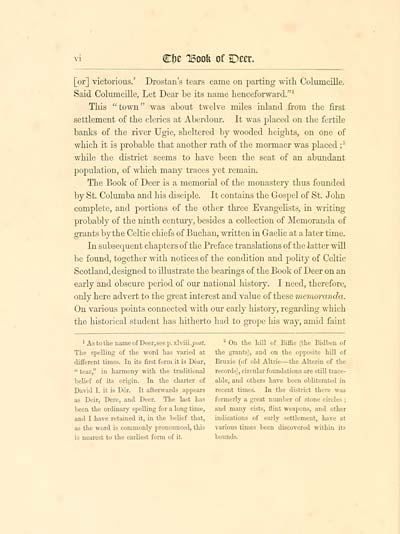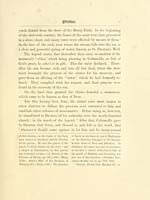Ossian Collection > Book of Deer
(20)
Download files
Complete book:
Individual page:
Thumbnail gallery: Grid view | List view

Cf)C TBook of Deer.
[or] victorious.' Drostan's tears came on parting with Columcille.
Said Columcille, Let Dear be its name henceforward." 1
This "town" was about twelve mUes inland from the first
settlement of the clerics at Aberdour. It was placed on the fertile
banks of the river Ugie, sheltered by wooded heights, on one of
which it is probable that another rath of the mormaer was placed ; 2
while the district seems to have been the seat of an abundant
population, of which many traces yet remain.
The Book of Deer is a memorial of the monastery thus founded
by St. Columba and his disciple. It contains the Gospel of St. John
complete, and portions of the other three Evangelists, in writing
probably of the ninth century, besides a collection of Memoranda of
grants by the Celtic chiefs of Buchan, written in Gaelic at a later time.
In subsequent chapters of the Preface translations of the latter will
be found, together with notices of the condition and polity of Celtic
Scotland, designed to illustrate the bearings of the Book of Deer on an
early and obscure period of our national history. I need, therefore,
only here advert to the great interest and value of these memoranda.
On various points connected with our early history, regarding which
the historical student has hitherto had to grope his way, amid faint
1 As to the name of Deer, seep, xlviii. post. " On the hill of Biffie (the Bidben of
The spelling of the word has varied at the grants), and on the opposite hill of
different times. In its first form it is Dear, Bruxie (of old Altrie — the Alterin of the
"tear," in harmony with the traditional records), circular foundations ;m> still t rare-
belief of its origin. In the charter of able, and others have been obliterated in
David I. it is Der. It afterwards appears recent times. In the district there was
as Deir, Dere, and Deer. The last has formerly a great number of stone circles :
been the ordinary spelling for a long time, and many n -t -. Hint weapons, and other
ami I have retained it, in the belief that, indications of early settlement, have a1
18 the word i- commonly pronounced, this various times been discovered within its
is nearest to the earliest form of it. bounds.
[or] victorious.' Drostan's tears came on parting with Columcille.
Said Columcille, Let Dear be its name henceforward." 1
This "town" was about twelve mUes inland from the first
settlement of the clerics at Aberdour. It was placed on the fertile
banks of the river Ugie, sheltered by wooded heights, on one of
which it is probable that another rath of the mormaer was placed ; 2
while the district seems to have been the seat of an abundant
population, of which many traces yet remain.
The Book of Deer is a memorial of the monastery thus founded
by St. Columba and his disciple. It contains the Gospel of St. John
complete, and portions of the other three Evangelists, in writing
probably of the ninth century, besides a collection of Memoranda of
grants by the Celtic chiefs of Buchan, written in Gaelic at a later time.
In subsequent chapters of the Preface translations of the latter will
be found, together with notices of the condition and polity of Celtic
Scotland, designed to illustrate the bearings of the Book of Deer on an
early and obscure period of our national history. I need, therefore,
only here advert to the great interest and value of these memoranda.
On various points connected with our early history, regarding which
the historical student has hitherto had to grope his way, amid faint
1 As to the name of Deer, seep, xlviii. post. " On the hill of Biffie (the Bidben of
The spelling of the word has varied at the grants), and on the opposite hill of
different times. In its first form it is Dear, Bruxie (of old Altrie — the Alterin of the
"tear," in harmony with the traditional records), circular foundations ;m> still t rare-
belief of its origin. In the charter of able, and others have been obliterated in
David I. it is Der. It afterwards appears recent times. In the district there was
as Deir, Dere, and Deer. The last has formerly a great number of stone circles :
been the ordinary spelling for a long time, and many n -t -. Hint weapons, and other
ami I have retained it, in the belief that, indications of early settlement, have a1
18 the word i- commonly pronounced, this various times been discovered within its
is nearest to the earliest form of it. bounds.
Set display mode to: Large image | Transcription
Images and transcriptions on this page, including medium image downloads, may be used under the Creative Commons Attribution 4.0 International Licence unless otherwise stated. ![]()
| Early Gaelic Book Collections > Ossian Collection > Book of Deer > (20) |
|---|
| Permanent URL | https://digital.nls.uk/82539533 |
|---|
| Description | Selected books from the Ossian Collection of 327 volumes, originally assembled by J. Norman Methven of Perth. Different editions and translations of James MacPherson's epic poem 'Ossian', some with a map of the 'Kingdom of Connor'. Also secondary material relating to Ossianic poetry and the Ossian controversy. |
|---|
| Description | Selected items from five 'Special and Named Printed Collections'. Includes books in Gaelic and other Celtic languages, works about the Gaels, their languages, literature, culture and history. |
|---|

